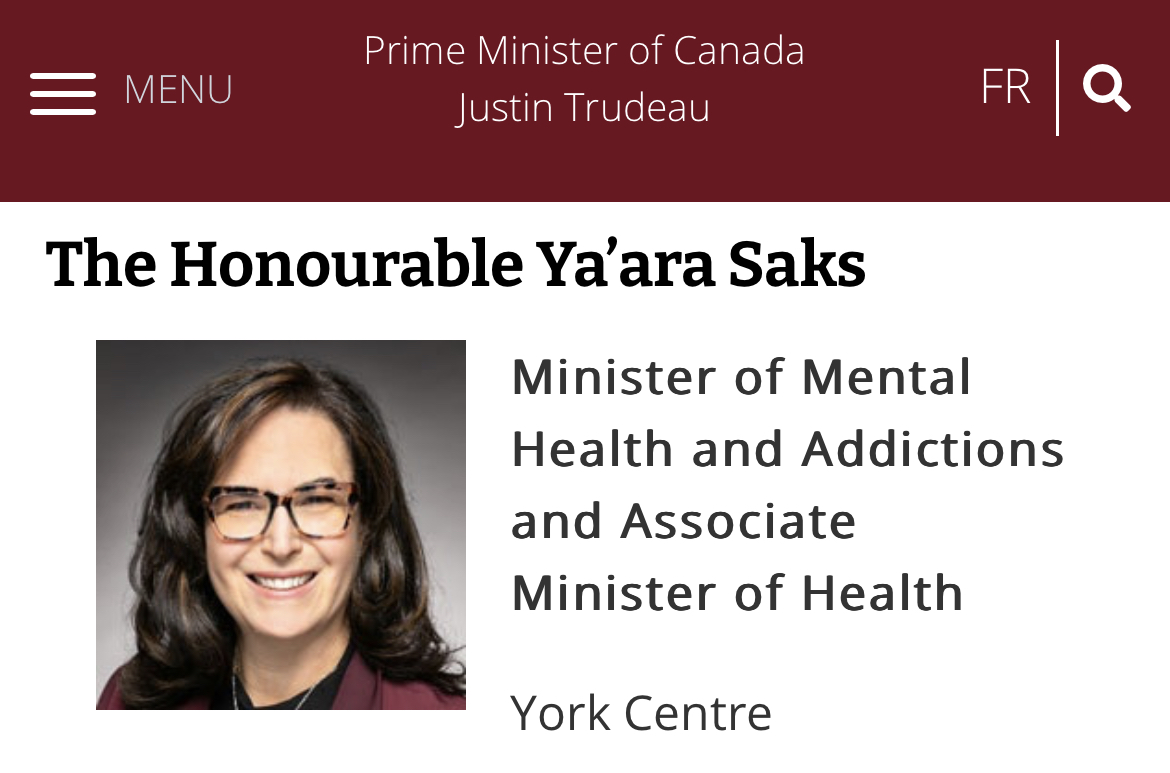The portfolio handed to Ya’ara Saks on July 26 was already packed with challenges when it was created during a peak time of COVID.
But those challenges have only grown more acute since then.
Prior to her new posting as Minister of Mental Health and Addictions, the Liberal MP for Toronto’s York Centre riding was Parliamentary Secretary to the Minister of Families, Children and Social Development.
Saks, who was first elected in a 2020 byelection, takes over a position that was initiated in October 2021—and previously held by Carolyn Bennett, who is now winding down her lengthy career as Liberal MP for the St. Paul’s riding of Toronto.
But even as the pandemic has waned, mental health has not rebounded to pre-COVID levels.
Overdose deaths have continued to increase. A total of 7,328 “apparent opioid toxicity deaths” occurred in 2022, an average of 20 deaths per day, according to the Public Health Agency of Canada. In 2019, prior to the pandemic, the average number of deaths per day was 10, which increased to a peak of 22 in 2021, the agency reported.
Meanwhile, regular surveys by Mental Health Research Canada find that levels of high anxiety and depression haven’t changed since the summer of 2022.
The overdose crisis is her first priority, Saks said. She is travelling to British Columbia this week where a pilot project decriminalizing possession of small amounts of drugs is underway.
In January, the federal government exempted B.C. residents from criminal charges for possessing up to 2.5 grams of illegal drugs as part of a three-year pilot project. A number of other municipalities, including Toronto, have also requested permission to decriminalize simple possession.
The government has also invested in safer supply programs, increased opioid treatment and supervised consumption sites, according to a statement announcing the decriminalization initiative.
The approach has generated criticism from Conservative Leader Pierre Poilievre, who says it has made Vancouver “hell on earth.”
“We’re told that giving out and decriminalizing hard drugs would reduce drug overdoses,” Poilievre told the House of Commons in May. “These so-called experts are typically pie in the sky theorists with no experience getting people off drugs, or they’re members of the misery industry—those paid activists and public health bureaucrats whose jobs depend on the crisis continuing.”
Saks disputes the claims, saying Canada has studied similar initiatives in other jurisdictions, such as Portugal, and is monitoring the experience in B.C. closely.
“The war on drugs was shown not to be an effective way to handle addiction and substance use for those who are suffering through the opioid crisis,” she said in an interview with The CJN.
“The difference between what the government is doing with regards to harm reduction and safe supply and what the Conservatives have been putting out into the world is the difference between evidence and science-based approaches and false narratives.”
Saks will also be overseeing a massive project first announced in 2021, the launch of a national, bilingual, suicide-prevention hotline. The service is slated to come online in November.
The 24-hour line will be administered by Toronto’s Centre for Addiction and Mental Health. Critics, including the Canadian Mental Health Association, say that without additional funding, the crisis line will result in increasing already long waiting lists for help.
Saks confirmed that the hotline, 988, is “on target” to launch in November, as planned. The federal government has earmarked $156 million for the program roll out, but providing mental health services is a shared financial responsibility.
“The 988 is meant to be a crisis line, it’s not a preventative measure,” Saks said. “We also recognize that mental health and the ongoing supports that are needed, beyond that moment of crisis, really lies with the provinces to work with us in partnership, to ensure that once the crisis has abated, that they are directed to the services that are local and available to them.”
Saks, who owned a yoga studio and was the director of a charity that focused on mental health before she was elected, says her experiences have prepared her for the challenges of the portfolio.
“We’re in a moment when we look at the mental health of Canadians, we have to understand that this is a top-of-mind issue and that we have to approach it with science, but also with a lot of compassion.”







